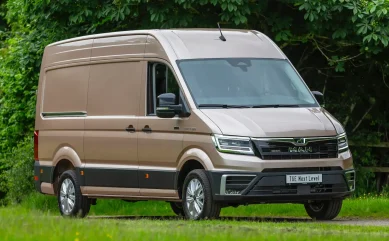
The lack of an electric version of MAN’s TGE Next Level is prompting the manufacturer to target smaller fleets rather than major operators. So says Tobias Schnahs, MAN international vice president for van sales management.
There is little point in approaching the big parcels companies with a diesel-only light commercial line-up, he says, as all their focus is on zero-emission.
“Although it’s not that much of an issue so far, the absence of an electric model is giving us some headaches,” he admits. “It will continue to do so over the next few years as things get tougher.”
As a consequence, MAN is focusing on small to medium-size enterprises that are perhaps less wedded to the battery-electric gospel and may be wondering about the likely second-hand value of any electric vans they may acquire.
“They’ve long been our targets anyway,” he says. “We’ve never had that strong a big fleet focus.”
Derived from Volkswagen’s Crafter, TGE is marketed with a 2.0-litre TDI diesel at 140hp, 163hp and 177hp, plus a tuned 202hp version that is unique to MAN. Factory-built electric TGEs and Crafters are unlikely to appear until 2027-2028, with MAN employing some carefully thought out strategies in the meantime which should ensure it is not penalised under the UK’s ZEV (Zero Emission Vehicles) mandate (see What Van? May/June 2025 issue).
As things stand, MAN is playing to TGE’s strengths, which include a package of new and revised driver assistance systems, many of which are fitted as standard.Nor is MAN is ignoring environmental concerns; far from it. “All the new TGEs can run on HVO – Hydrotreated Vegetable Oil,” Schnahs points out.
Made from renewable raw materials such as used cooking oil and vegetable oils and fats, HVO can be used as a direct replacement for diesel. With no fossil fuel content it can deliver an up-to-90% well-to-wheel cut in CO2 emissions, as its advocates point out.
TGE customers can also benefit from out-of-hours servicing if they wish to because the van is supported by the MAN truck dealer network.
Hauliers expect to be able to have their vehicles maintained and repaired overnight as a matter of course and TGE operators can avail themselves of the same facility. Many rival light commercials are sold through car dealerships with workshops that tend not to keep late hours.
With no electric model, MAN is vulnerable to competition from Chinese producers such as Maxus and newcomer Farizon, both of which are driving ahead with zero-emission products. “We have to take Chinese competition seriously, but the manufacturers concerned don’t offer the level of aftersales support that we do,” he comments.
That situation is likely to change over the next five years, he believes, as the Chinese brands beef up their own dealer networks and aftermarket packages. By the time they do so, however, MAN will be ready with its own zero-emission offering, he says.
Currently, the company is rolling out TGE in a market that is proving tough for light commercial makers. “Demand across Europe is down by 15%,” he says.
At the time of writing, UK van registrations had fallen for the sixth month in succession, down by 11.3% since the start of the year.
Retail sales – sales to small businesses – still seem to be reasonably healthy across Europe, says Schnahs, so the marketing policy he has outlined would seem to make sense. However, many other prospective customers are hesitant about committing themselves in a climate of political and economic uncertainty and rising prices, he says, with the war in Ukraine still raging.
“The attitude seems to be, ‘If I don’t have to buy now, then I’d rather leave it,’” he observes.
The good news for businesses ordering vans from the factory rather than from stock is that they shouldn’t have to wait too long for delivery. “With TGE, it’s about 12 weeks” he says.
Not that MAN is pessimistic about TGE sales.
“We should see an upturn in the market in the second half of the year which should lead to it becoming more stable, and we’re planning to sell over 30,000 TGEs in 2025 compared with 28,000 in 2024,” he says. “We’re taking some sales from Mercedes [Sprinter] and some from VW.”
MAN is busy opening up new markets for the model, including Croatia and – somewhat further afield – Dubai.
“We’re looking at some of the other markets in the Middle East as well, including Abu Dhabi and Qatar,” he says. “We’ve got our eye on Saudi Arabia too.”





